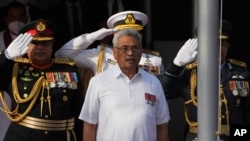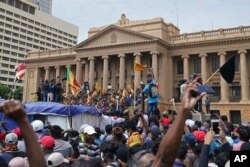Embattled Sri Lankan President Gotabaya Rajapaksa confirmed that he will resign Wednesday, even as opposition parties try to reach a consensus on forming a new government in a country confronted with an economic crisis and a political vacuum.
The whereabouts of Rajapaksa, who has faced monthslong demands for his resignation in the wake of a devastating economic downturn, remain unknown. He was taken from his residence Saturday to a secure location before thousands of protesters stormed the premises.
Prime Minister Ranil Wickremesinghe’s office issued a statement Monday stating that Rajapaksa said he would resign on July 13.
Rajapaksa's decision to resign after initially defying protesters’ demands was first announced Saturday by the parliament’s speaker. But hundreds of protesters continued to occupy his colonial-era mansion and office in Colombo for a third day, refusing to vacate the properties until he officially steps down.
The prime minister’s office also said that all Cabinet ministers would resign once a decision on a new unity government is reached.
The main opposition party, Samagi Jana Balawegaya, met with smaller political groups Sunday to decide on a new government and to build support for their leader, Sajith Premadasa. For months, the opposition has demanded that Rajapaksa step aside and make way for a unity government that would include all political parties.
Wickremesinghe has also offered to step down and make way for an all-party government but said he will stay in office until a new administration is in place.
“A government has to function according to the law. I am here to protect the constitution, and through it fulfill the people’s demands. What we need today is an all-party government, and we will take steps to establish that,” Wickremesinghe said in a video statement.
Wickremesinghe was appointed in May to solve the country’s economic woes but was seen as being too close to the family. Wickremesinghe also became a target of public anger. His private residence in Colombo was set on fire on Saturday, and his office has also been occupied by protesters.
There was a sense of jubilation among long-time protesters who had chanted, “Gota, go home.” Many called it a “historic moment,” a “true citizens’ struggle” and took selfies inside the president’s residence to mark what they called the victory of the protest movement.
Police said protesters handed over $50,000 in cash that they found inside the residence.
The public’s ire was directed against Rajapaksa and other family members who had occupied powerful posts in the government for years. The powerful political dynasty, which returned to power in 2019, is blamed for policies that have devastated the economy of the island nation of 22 million.
Frustration has been building over the worsening fuel shortages and runaway inflation that have led to a massive increase in food prices.
Long lines were seen at fuel stations on Monday as limited sales of fuel to private vehicles resumed. In recent weeks, the country has come to a near standstill as it faces difficulties importing food, fuel or medicines. Because of its depleted foreign exchange reserves, schools have been closed for three weeks, and government employees have been asked to work from home. Power outages and fuel shortages have made it difficult for factories to operate.
While the crisis was years in the making, mismanagement during Rajapaksa’s tenure compounded the problems, according to economists. Populist tax breaks depleted government revenues, and an abrupt switch to organic farming led to a steep fall in agricultural production, while the pandemic battered the country’s tourist-dependent economy. Massive loans to finance infrastructure projects built by China added to the debt burden.
The country has been negotiating with the International Monetary Fund for a bailout.
"We hope for a resolution of the current situation that will allow for resumption of our dialogue on an IMF-supported program," the IMF said in a statement.





